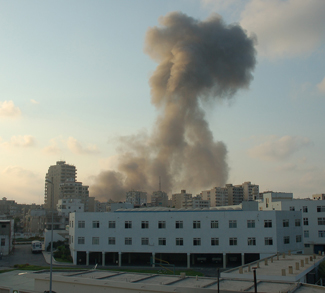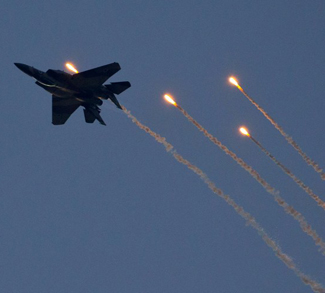Summary
With Israeli support, Palestinian President, Mahmoud Abbas, has moved his armed loyalists into key West Bank cities in preparation of a possible conflict with his rival Hamas in January. Abbas’ constitutional term as president ceases in January, but he refuses to step down. The constitutional crises will almost certainly lead to armed conflict between Abbas’ Fatah faction and Hamas, endangering any hopes of an Israeli-Palestine peace deal any time in the near future.
Analysis
Reports out of the Middle East indicate that Mahmoud Abbas, aka Abu Mazen, President of the Palestinian Authority, has moved 550 loyalist officers into key positions in the West Bank city of Hebron. Hebron is the West Bank’s largest city, and considered a stronghold of Abbas’ rival, Hamas. The armed takeover of Hebron, coordinated with the Israeli army, security forces and intelligence services, is the third city in the West Bank to be reinforced with armed Fatah loyalists.
Abbas’ show of force appears to be a calculated move by the embattled President to prevent Hamas from taking control of the West Bank as they have done in the Gaza Strip. The genesis of Abbas and Israel’s concern is the Palestinian constitutional law that mandates an end to Abbas’ four-year tenure as President in January 2009. Hamas is insisting that Palestinian law requires a presidential election in January, while Abbas’ group, Fatah, maintains that legislation drafted linking the presidential and parliamentary elections together, in January 2010, is operative, despite not having been passed by the Palestinian Parliament.
Admittedly, it is almost certain the Palestinian Parliament, which is populated with Abbas loyalists, having been personally installed by Abbas after sacking the previously elected Hamas led government in retaliation for losing Gaza to his rivals, will surely approve of Abbas’ refusal to step down at the end of his term in office.
Fatah hopes that by linking the Palestinian parliamentary and presidential elections they can recoup their losses during the last cycle by riding the popularity of Abbas to the polls. However, it should be remembered that Fatah was ousted as the Palestine Parliament’s majority party due to a protest vote against perceived corruption; should Abbas ignore the law, triggering a constitutional crises simply to remain in power, like so many previous and contemporary Arab leaders, there is good reason to believe that his own hereto unassailable public persona will be badly, perhaps irrecovably, damaged.
As a result, the Israelis and Americans, having invested heavily in Abbas, are scrambling to neutralize the looming crises in Palestine. Under American aegis, Israel continues to pursue a comprehensive peace deal with the Palestinians through Abbas. Should Abbas lose the crises, or, more likely, lose his standing amongst the Palestinians whether or not he emerges with his power intact, his capacity to make peace with Israel on behalf of all the Palestinians will be either greatly diminished, or utterly shattered.
Israel is signalling that it is ready to move quickly to explore a Saudi proposed peace plan that would cover the whole region, as it hopes to avoid having to deal with Hamas, particularly in light of recent Egyptian efforts to reconcile the two rival Palestinian factions by forming a unity government. Should the Egyptian effort prove fruitful, Hamas will be in power in both Palestinian territories, the American led international blockade of Gaza will be broken (as Egypt has announced it will unseal the Egypt-Gaza border) and Syria will be ascendant, on account of Damascus backed Hezbollah and Hamas forming governments in Lebanon and Palestine, respectively.
It is this dire prospect that has animated Abbas, with Israeli support and American approval, to making this power play in the West Bank.
The only problem is that the last time Abbas tried to utilize his armed loyalists, with Israeli support and American approval/urging/funding/training, to oust Hamas, Fatah lost control of the Gaza strip. If Abbas loses the next round of internecine conflict with Hamas, the latter will end up in control of all the Palestinian territories.
And, if that were to come to pass, there is every reason to believe that Israel, backed by the Americans, will declare war against Palestine, ending any hopes of peace in the foreseeable future.
Manjit Singh is a contributor to Geopoliticalmonitor.com



